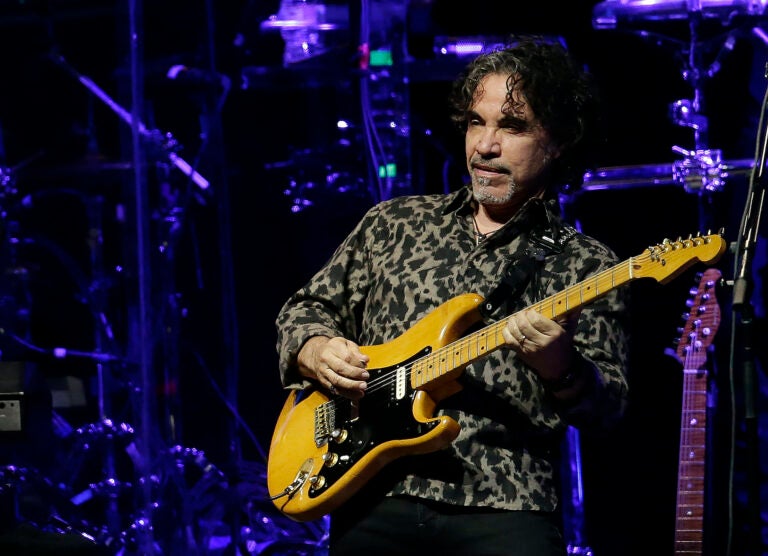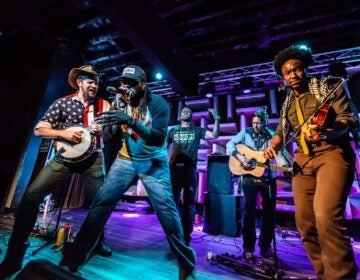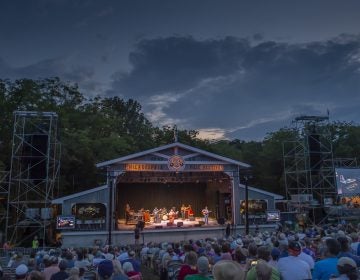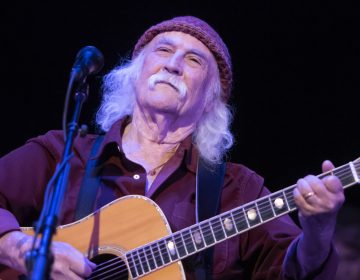John Oates returns to his roots for Philadelphia Folk Festival 2024
John Oates is celebrating his new album “Reunion” with a heartfelt return to folk.
Listen 7:59
John Oates performs in Glendale, Ariz. on July 17, 2017. (Photo by Rick Scuteri/Invision/AP, File)
From Philly and the Pa. suburbs to South Jersey and Delaware, what would you like WHYY News to cover? Let us know!
Singer-songwriter John Oates is reconnecting with his roots in the Philly region this week.
Oates, who grew up in North Wales, Pennsylvania, will perform at Cape May’s Convention Hall on Thursday and headline the Philadelphia Folk Festival in Upper Salford, Montgomery County, this weekend.
Oates met Daryl Hall at Temple University. The duo formed the band Daryl Hall and John Oates in the 1970s and enjoyed international fame over the course of five decades. Among their enduring New Wave soul hits were “Kiss on My List,” “I Can’t Go for That,” and “She’s Gone.”
Twenty years ago, they were inducted into the Songwriters Hall of Fame. Ten years ago, they made it into the Rock and Roll Hall of Fame. Today, Oates performs music of his pre-fame liking, steeped in Americana, blues, jazz, folk, gospel and roots. He’s released six solo albums, and his latest record is called “Reunion.” Oates, who lives in Nashville, recently spoke with WHYY “Morning Edition” host Jennifer Lynn about the music he’s been making.
___
Jennifer Lynn: Songs with names of places feel very organic. Let’s start with “Arkansas,” which we hear as we’re talking. Is this song about a place or about a feeling, or both?
John Oates: Both. It was inspired by a place. It was a little town called Wilson, Arkansas, about 25 miles northwest of Memphis, and at one time had been a huge cotton plantation. It’s along the banks of the Mississippi River and Highway 61, the blues highway, goes right down the middle of the town. It kind of epitomized this great American music tradition that comes up the Mississippi River. You know, it created the blues, stopped in Memphis and then in St. Louis, became something else and eventually reached Chicago, evolving into rock and roll. And I just felt, as a songwriter, I wanted to try to capture whatever I was feeling at that moment.
JL: Yeah, and places really help us gain this sense of identity.
JO: You’re right. I mean, every place you’re in. I was born in New York City, but I grew up in Pennsylvania and eventually moved to Philadelphia. Philadelphia was a major, major part of my musical life: the folk music that I heard, Mississippi John Hurt and Doc Watson during the early ’60s, during the folk revival; the great R&B and soul music that I heard at the Uptown Theater, Smokey Robinson, the Temptations, Otis Redding, the Miracles and so on and so forth. They all informed something about what I do today. I put my own original twist on it, but deep down inside that musical DNA, it makes me who I am.
JL: In the song “I Found Love,” it’s about identity. You say, “I knew a man who thought he had everything,” and then this character in the song takes a fall, doesn’t see what’s really important in life, like love and someone to love. I think the lyric is, “It’s the gift, not the prize we are searching for.” Is this a philosophy that you have grown to embrace? Have you always had it?
JO: That was a discovery that I made in the late ’90s, after I really had stepped off the hamster wheel of touring for quite a while. During the ’90s, Daryl and I really weren’t doing very much. I met my future wife, built a house, had a kid, and that song is directly related to her and to the things that I discovered by becoming a father and a husband, and really putting my music into perspective and not allowing my music to become the only thing in my life.
JL: I listened to that song, and I’m looking for an answer to, you know, who we are. It’s your answer, but then it kind of becomes my answer too. Isn’t that the wonderful thing about the sort of magical sharing of your music? Your story becomes something I can resonate with.
JO: That’s kind of the way I define having a hit. There are a lot of levels of hits. It’s not only your chart position. It’s really whether your music somehow touches or reaches or resonates with someone.
JL: The song “All I Am” is about simplicity, being grounded below the stars. It’s a really lovely moment.
JO: I wrote that song a long time ago. I wrote that song when my son was born. It’s a song about projecting what I would like, perhaps, him or people to think of me if I wasn’t there. It’s really very symbolic of all the songs on the album. This is a very mature album. It’s a very thoughtful album. It’s a very introspective album. And that song I’ve been saving for years, literally since the late ’90s. I didn’t have the proper place for it. This album was the perfect format for it.
JL: The title song, “Reunion,” feels familiar to me. Why do you think that is? Do you get that a lot from people?”
JO: That could be good or it could be bad. I’m hoping you feel like it’s good. That song was inspired by my dad. He just turned 101. It’s about going to the next level, the next Bardo, the next place that we all are going to end up eventually. Not so much about passing away as it is rediscovering something in myself. It’s the reuniting of myself with what I was talking about earlier, with the guy that I used to be, the guy that was inspired by music as a child.
JL: So I’m picturing you under the stars, a beautiful night at the Philadelphia Folk Festival. You said you went when you were younger. Have you gone in recent times?
JO: No, I haven’t been there in years and years. I have this crazy connection to the Philadelphia Folk Festival. When I was a freshman at Temple University and I moved to Center City, I was looking for a part-time job, so I went to the Esther Halpern School of Folk Music on Walnut Street at 23rd, and I walked in with my guitar and said, “Hi, I’m looking for a job.” And she said, “Play me something.” So I did. And she said, “Well, you can teach the beginners and the intermediates.” And she introduced me to a guy named Jerry Ricks, who was in another little studio in the back of the house, and said he’s teaching the advanced students. I said, “Oh, good, well, then I’ll just take lessons from him too.” And he became one of my best friends and mentors. Esther Halpern and her husband were the original people who created the Philadelphia Folk Festival. Going back to play is going to be really emotional and really amazing. It’s a true full-circle moment.
JL: Well, thank you so much. This has been great.
JO: Yeah, really good interview, very deep. I didn’t know this is where we were going, but I like it.

Get daily updates from WHYY News!
WHYY is your source for fact-based, in-depth journalism and information. As a nonprofit organization, we rely on financial support from readers like you. Please give today.





